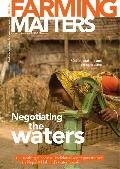The livelihoods of small-scale farmers depend on fair access to water, yet their interests are often not taken into account, nor their voices heard.
What does good governance mean in terms of water management? Should the focus of governance efforts be on drafting new legislation? Or is good governance reflected in the enforcement of the law?

The root cause of this is that people in this country are cutting down too many trees. The story is well-known: people are poor, they cut trees for sale or for home use, the land degrades, production goes down, and people get poorer. Interestingly, when you ask the farmers you will find that everybody knows this. So it is not just a question of education, because if one farmer stops cutting and another continues to do so to make some money, the problem doesn’t go away. Similarly, if one community preserves trees in the landscape, another may come and cut them down. Pastoralists are very mobile and if the situation is not regulated jointly with farmers, no tree will grow to maturity.
Thus restoring the landscape and preserving the soil is a real multistakeholder task. Local level joint action (such as Integrated Water Management) can provide the basis for such a response. People need alternative income sources, and trees may well be a good means if they are allowed to grow long enough. But local level action is not enough.
The task is so vast that even our organisation, with 60,000 members, can hardly start to address the problem. We all have a role to play, but it takes a strong, respected actor to ensure that everybody takes part and nobody takes a free ride.
Who has the power and the authority to address the problem at this vast scale? Who can coordinate farmer organisations and inspire local governments and traditional chiefs to actively support initiatives? I think that the state is the sole actor with such powers and means. Without the firm and active involvement of the state, nobody can solve the land degradation problem.
We, farmer organisations, are prepared to play our role in this enormous task. Yet we need the state to back us up, to make funds available, to pass legislation, enforce the rules and help and support local authorities to carry them out.
Text: Mamoudou Hassane
Mamoudou Hassane can be reached at mhassane64@yahoo.fr
Mamoudou Hassane is Executive Secretary of MOORIBEN, the Federation of Farmers´ Organisations in Niger.

Ecosystems that provide water are degraded or drying completely. Climate change is already having an effect on the world’s hydrological cycles, and millions of people have seen their livelihoods affected by floods or droughts, with many forced to migrate to other areas.
Many countries, particularly in South America, have recently modified their legislation on water, announcing an innovative approach that is simultaneously multi-sectoral, decentralised, participatory, environmentally sustainable, equitable, and which also gives due recognition to the customary rights of peoples. The recently passed law in Peru includes all these principles. But, in spite of the lofty words, there are some serious gaps in the legislation and there are articles that specifically contradict these principles. Even more importantly, there does not seem to be a serious interest in enforcing these principles and benefiting those who most need support, such as smallscale farmers.
One of the major flaws is that this law, like others, does not require or impose a thorough land planning process, which makes watershed management virtually impossible. Large-scale operations, such as mining concessions, know no boundaries. Much land that is currently used for food production is vulnerable to being displaced by agribusiness, biofuel enterprises, or mining projects, all of which compete for the land and the water sources on which farmers depend. Unlike small-scale farmers, many of these large-scale projects are subsidised or receive financial benefits from the state.
Moreover, they benefit from preferential water rights, which the state is now granting under the same law. Disregarding traditional use, the new law is “assigning” water as if it had never been used before. This will place food security in Peru at serious risk for decades. It is hardly surprising that the accumulation of land and water rights in countries like Peru is the cause of more and more socio-environmental conflicts. The authorities need to move beyond the discourse they are currently engaged in and begin to practise what they preach.
While the new legislation is welcome, it needs to be enforced in a way that takes all stakeholders into account, and not just the strong and powerful. And legislation needs not only to take water management theory into account, but also the practices and needs of millions of farmers.
Text: Mourik Bueno de Mesquita
Mourik Bueno de Mesquita can be reached at
mourik@casadelcorregidor.pe
Mourik Bueno de Mesquita heads the Andean Water Management Programme at the Centro Bartolomé de las Casas (CBC) in Cusco, Peru..

